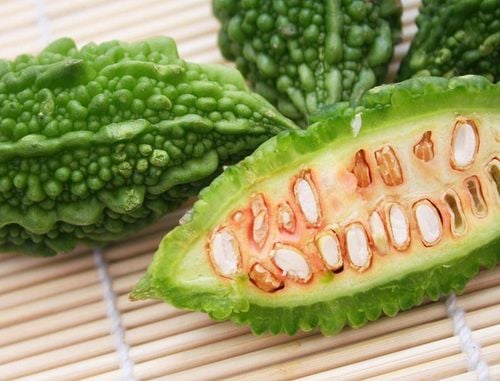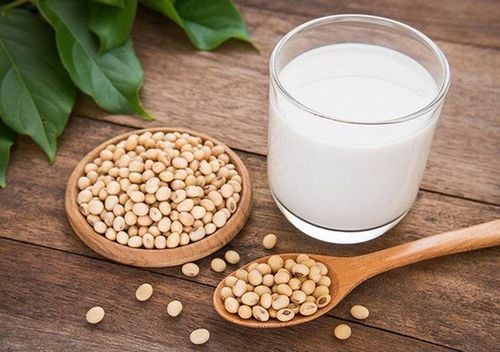This is an automatically translated article.
Breastfeeding is more challenging than formula feeding. Some mothers experience some problems related to breast milk production, such as not producing enough breast milk and blocked flow. There are many causes of this condition, including certain foods that affect milk loss. The following article will help you better understand these foods, and especially eat bitter melon while pregnant or breastfeeding.1. 14 foods to avoid while breastfeeding
1.1. Coffee Why is coffee at the top of this list? That's because of the caffeine content in it. This amount of caffeine passes into breast milk and accordingly into the baby's digestive tract. The digestive tract in newborns is immature, so it cannot excrete caffeine effectively. Therefore, the accumulation of caffeine in the child's body will cause irritation, difficulty sleeping and irritability. High caffeine intake can lower iron levels in breast milk and lower hemoglobin levels in babies. Therefore, the best solution is to cut back on coffee while breastfeeding.1.2. Chocolate Chocolate seems to be a very popular food among the weak. But when breastfeeding, mothers need to control this hobby of theirs. Chocolate is rich in a substance called theobromine, which has similar effects to caffeine. If you feel your child's irritability is caused by eating chocolate, stay away from him.
But how much is too much? The only way to tell if you're getting too much caffeine or theobromine is to observe your child's behavior. If a mother consumes more than 750mg of caffeine or theobromine per day, the baby may exhibit erratic and fussy behavior, in addition to sleep problems.
Trắc nghiệm: Vì sao mẹ sinh mổ xong khó có sữa ngay?
Vì sao mẹ sinh mổ xong khó có sữa ngay là thắc mắc và lo lắng chung của nhiều sản phụ. Bài trắc nghiệm này sẽ giúp sản phụ giải đáp thắc mắc cũng như tìm hiểu được phương pháp gọi sữa về sau sinh mổ.The following content is prepared under supervision of Thạc sĩ, Bác sĩ y khoa, Tạ Quốc Bản , Sản phụ khoa , Khoa Sản phụ khoa - Bệnh viện Đa khoa Quốc tế Vinmec Phú Quốc
1.3. Citrus fruits Citrus fruits are a good source of vitamin C, but their acidic components can cause minor stomach irritation. A baby's immature digestive tract won't be able to come into contact with these ingredients, thus leading to diaper rash, fussiness, trouble sleeping and more. That said, moms don't have to. Completely eliminate citrus fruits from your diet. Therefore, pregnant or lactating women should eat one or two oranges and grapefruits daily. But if you decide to completely cut back on citrus fruits like lemons, grapefruit, limes, and oranges, replace them with some other vitamin C-rich foods like papaya, pineapple, strawberries, or greens. and mango.
1.4. Broccoli Research shows that breastfeeding mothers who eat broccoli can cause breathing problems for babies. Some other foods to avoid while breastfeeding include: onions, cauliflower, cabbage, and cucumbers. However, there is no evidence based scientific studies to prove it.
1.5. High-mercury fish Mercury appears in breast milk if the mother eats fish with high levels of mercury and other foods high in mercury, which can affect the baby's neurological development. According to the United States Department of Agriculture, “If a nursing woman consumes large amounts of foods rich in mercury, it can harm a child's development by passing into breast milk and then to the baby. .”Eat fish (including canned tuna) in moderation, no more than two servings a week, but avoid fish high in mercury.
1.6. Alcohol Alcohol can be passed from mother to baby through breast milk and affect the neurological development of the baby. But after nine months of not drinking, having an occasional glass of wine or beer isn't such a bad choice. Studies have shown that a few units of alcohol once or twice a week are not harmful to children. Moderation is key, said Dr. Jack Newman, a member of the LLL Medical Advisory Board. In his book Breastfeeding Methods, Newman says, “Breastfeeding mothers can drink alcohol in moderation. Quitting alcohol is like unnecessarily restricting the lives of nursing mothers.”
1.7. Peanuts If your family has a history of peanut allergies, avoid eating peanuts until your baby is weaned. The allergenic proteins in peanuts can pass into breast milk and then pass to the baby. The child may develop a rash, wheeze, or hives. Eating even a small amount of peanuts can cause allergens to pass into breast milk for one to six hours. Research shows that children exposed to peanuts at an early age are at increased risk of developing a peanut allergy throughout life. However, there is no adequate evidence to suggest that avoiding peanuts during breastfeeding will prevent peanut allergy in infants.
1.8. Parsley and mint Parsley or parsley and mint are two herbs that, if taken in large amounts, can reduce breast milk production. Whenever you eat these herbs, keep an eye on your milk supply, especially when your baby is in the growth spurt, which is the period when babies need more milk than other periods. In fact, mothers often drink mint tea when they want to stop lactation after weaning. Another herb, sage, also reduces milk supply.

Children who are intolerant to milk also often show signs of a soy allergy. Choose organic varieties of dairy, meat and poultry that are high in fat, as they do not use antibiotics, growth hormones, chemicals or pesticides in the production process.
1.10. Garlic The smell of garlic can also penetrate the milk! That is the conclusion of a recent study. Some babies like it. Some don't. If you find your baby uncomfortable while feeding, check to see if the reason is due to garlic. Some children may wince or cry at the slightly strong smell of garlic.
1.11. Spicy foods Spicy foods can be irritating for some babies, while others are perfectly fine with it. A little pepper is more than enough to make some kids feel uncomfortable. So consider cutting back on some spicy foods while breastfeeding.
1.12. Wheat Gluten intolerance is a common food problem because it leads to bloody stools, a sensitive stomach, and fussiness. Like any other food, the best way to diagnose an allergy is to eliminate it from the diet. Some mothers choose to eliminate all foods that normally cause problems and gradually introduce foods to their babies one at a time.
1.13. Corn Allergies to corn are common in infants and toddlers. They cause discomfort and rashes for babies. If you observe your child is allergic to corn, eliminate it from your diet.
1.14. Eggs or shellfish A family history of specific food allergies is associated with increased risk in infants and young children. If someone is allergic to shellfish or eggs in your family, temporarily stop consuming while you're breastfeeding. Egg allergy, mainly in the form of sensitivity to egg whites, is quite common.
2. Can you eat bitter melon while breastfeeding?
Bitter melon is a food with too little fat, so eating a lot of bitter melon is not beneficial for the diet that needs to supplement a lot of nutrition of postpartum women. In particular, eating a lot of bitter melon can cause mothers to lower blood sugar. In addition, bitter melon seeds also contain a chemical called vicine, a toxin that affects the nervous system causing headaches, abdominal pain and coma in susceptible people and can be transmitted. from mother to child through breast milk endangers the developing immune system of the baby.
Bitter gourd or folk commonly known as bitter melon is one of the quite popular dishes in our country. Bitter melon provides many vitamins, minerals and other essential nutrients for the body. Pregnancy and childbirth are the happiest moments in a woman's life. Pregnant mothers in the early stages of pregnancy should eat bitter melon to maintain the healthy development of the fetus. However, for mothers who have just given birth and are breastfeeding, bitter melon is not an effective source of nutrients due to its low fat content and high vicine toxin. Therefore, along with some other foods such as coffee, chocolate, alcohol... Bitter melon is also classified as foods that nursing mothers should avoid.
Please regularly follow Vinmec website (www.vinmec.com) to update useful health care information and leave information when you need medical advice and support!
Please dial HOTLINE for more information or register for an appointment HERE. Download MyVinmec app to make appointments faster and to manage your bookings easily.














